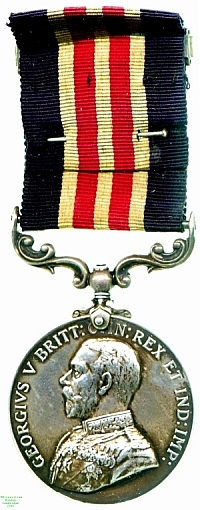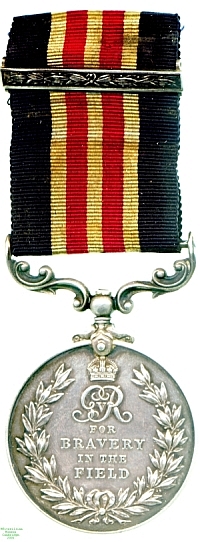
Obverse, a bust of King George V facing left

Reverse, inscription in centre, with a crown above and a laurel wreath around

Obverse, a bust of King George V facing left |

Reverse, inscription in centre, with a crown above and a laurel wreath around |
The Military Medal was instituted in 1916 to reward acts of bravery by NCOs and men in the Army (and at that point the Royal Flying Corps) that were felt worthy of recognition but not of the Distinguished Conduct Medal. Even though instituted halfway through the Great War of 1914-18, the medal was awarded 115,600 times in the remainder of the conflict, and 5796 of these recipients won one or more bars to recognise a second award. The medal was awarded until 1993, when the Military Cross was extended to those of less than officer rank.
This medal was awarded to Private W. Spouge of the 3rd Grenadier Guards, and this award was published in the London Gazette for 11 November 1916. The Grenadier Guards hold battle honours for two battles on the Somme at about that time, and it was likely in one of these that Private Spouge earnt his medal. The former was the Battle of Flers-Courcelette in early September, which was the first battle in which tanks were used, but which nevertheless failed to make significant gains. The latter was the following Battle of Morval, in which the British experienced more success but the French were halted on their flank meaning that progress was only limited. These two battles were both fought in the appalling conditions which have made the Somme infamous, pouring rain, waterlogged trenches, battlegrounds of churned mud and barbed wire, open to sweeping fire and artillery, and as a result viciously high casualties, and there can be no doubt that Private Spouge earnt his medal.
The bar that it bears shows that he later qualified for the award again, moreover, and this in turn was noticed in the London Gazette for 13 March 1918. Although the unit had fought at Cambrai and Ypres in the winter of 1917, by March 1918 they were back at the Somme and it was presumably on these old fighting grounds that Private Spouge again earnt the decoration. Lester Watson acquired the medal at some point before 1928.